Tonight, Liu San will not talk about ancient times
Photo courtesy/Wu Limin
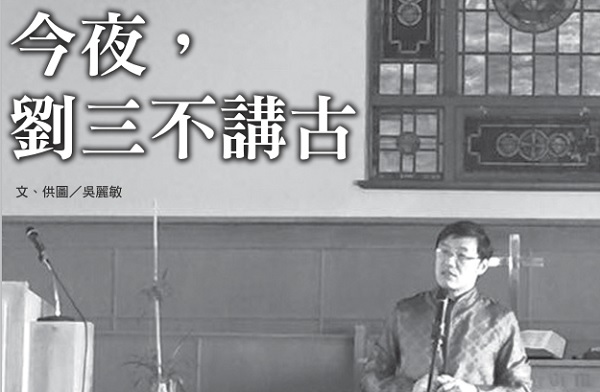
▲Pastor Liu Xiaoting lectured on "Happy Life" at the Taiwanese Reformed Church in New Jersey.
"Missionary work in the United States? Missionary work isn't all about going to remote and poor places. When did "going to the United States" become a kind of missionary work?" This is from Pastor Liu Xiaoting's missionary website "Liu San's Strange World" (http://www.liu3.org / ) about his missionary work in the United States. Many people believe that missionary work means preaching the gospel to rural and poor countries, just like when foreign missionaries went to China or Taiwan to preach.
“Since the Bible says ‘go into all the world’, then as John Wesley said, ‘all the world is my pastoral territory’! Otherwise, how can the teams from many American churches who return to Taiwan during the summer vacation be called ‘short-term mission teams’? Because Taiwan The conditions are not bad. Obviously, no matter which country a Christian goes to, as long as he preaches the gospel, he is a missionary, because no matter whether he is rich or poor, people have the same need for the gospel!"
—Pastor Liu San (http://www.liu3.org/index.html)
In early 2015, Pastor Liu Xiaoting was hired as the senior pastor of Taiwanese Lutheran Church of San Diego; from March 4 to 20, 2016, he was invited to preach in various churches in East New York and New Jersey. message and share the mission vision. Wu Limin, a special correspondent for Kingdom of God magazine, accompanied Pastor Liu to various churches to share information. The following is an exclusive interview with Pastor Liu conducted by the reporter on behalf of Kingdom of God magazine.
KRC: What inspired you to decide to come to the United States as a missionary?
Liu:Since I left Taiwan a few years ago to serve as a missionary in New Zealand and Australia, with the popularity of the Internet, I have begun to accept the concept of "global church" and understand the role of Chinese churches in various regions from the perspective of the entire Kingdom of God. In 2014, he accepted an invitation to go on a preaching tour in the United States, not only from the West Coast to the East Coast, but also by way of Hawaii. In the process, I have a deeper understanding of the reality of "globalization" and realized that God led the establishment of immigrant churches in North America decades ago for the sake of today's mission. To this day, these churches have been of great help to Chinese people around the world and have also brought critical influence to the ministry of new immigrants. In order to convey this vision, he accepted the invitation of the Taiwanese Christian Church in San Diego to serve as a missionary pastor, and received the support of the church to deliver the burden to Chinese churches across the United States at least twice a month.
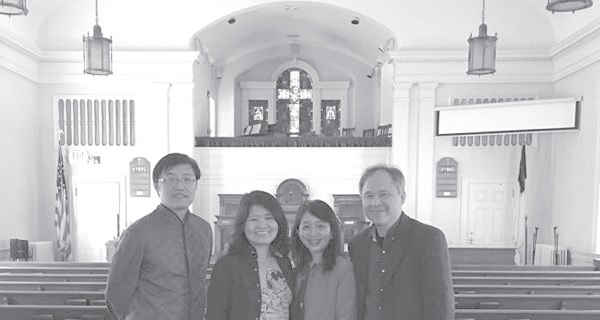
▲Pastor Liu Xiaoting shared at Canaan Church in Long Island, New York.
KRC: Please talk about the concept of "Global church" and how to implement it? What can churches in North America do?
Liu:The so-called "global church" refers to the fact that the Internet generation has truly brought about the "global village" lifestyle, and the global population is moving around. Under this trend, the traditional "local church" is bound to be upgraded, as stated in the Apostles' Creed In the era of "communion of saints", that is, the unity of the church, there is only one senior pastor in the world, Jesus, and the churches support each other more flexibly. In other words, church resources are about to enter an era of "globalization", talents will move around and be supported, and Christian unity will take on a new look, not just in terms of organizational structure, but in terms of vision and mission. link.
The global church has two characteristics:
The first is to find your role in the world. For example, the Chinese in Malaysia have been familiar with multiple languages since childhood and have endured hardships. They also live in a Muslim area. It can be said that they have a very suitable background for training as missionaries.
Let's take Hawaii as an example. This is a world-famous tourist island. The church on the island is very suitable to become a "rest and healing station" for the entire Kingdom of God. It is suitable for missionaries and pastors who are in their sabbatical year, or who are suffering from the pain of widowhood and emotional trauma. This trip can help people regain their strength through the reception of local church groups. The believers in the local church are also very suitable to receive some prayer training and become a "spiritual nursing station" dedicated to people starting over.
The second is to bring about the circulation of resources between churches through the circulation of information on the Internet. The first thing to bear the brunt is the way of missionary work. In the past, due to time and space constraints, short-term missionary work was a phased operation; but with the connection of the Internet, short-term missionary work can become a continuous operation, and team members continue to keep in touch with each other through online communities. , which can make the missionary effect last and even lead to follow-up visits. This is of great help to rural gospel ministry, and will gradually elevate the relationship between churches to a side-by-side relationship between "pastoral areas" and "pastoral areas", which is somewhat similar to the concept of establishing sister churches. Resources are shared among different churches because of a common vision.
The global church has released resources from the walls of traditional churches, maximized the use of funds and personnel, and enabled various professionals to support each other, which is of great help to the spread of the gospel.
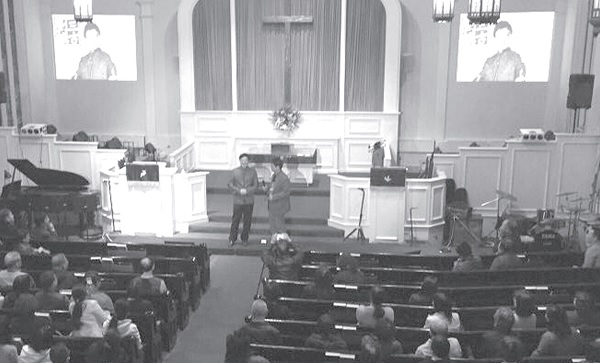
▲Pastor Liu Xiaoting, a second-generation Taiwanese from outside the province, shared information in Taiwanese at the New City Reformed Church in New York. Pastor Su Guicun (right), who is native to Taiwan, translated in Chinese for Pastor Liu.
KRC: What encouragement and advice do you have for Taiwanese Christians in North America?
Liu:The North American church is the most suitable region to promote the global church. Take San Diego as an example. This area is a popular retirement location in the United States. Therefore, the church can use its positioning as a "silver-haired church" to attract Asian Christians from all over the United States. This kind of gathering is not only helpful to local gospel ministries, but can also drive Asia's senior resources to serve, such as the introduction of Psalm Exercises and Songnian University, allowing more interaction between Taiwan and the United States, and expanding new horizons for senior ministry. It will be limited to a single area; and based on this, we will promote the gospel work for other age groups.
Let’s take the Bay Area as an example again. There are abundant talents in the Bay Area. If local churches can target outstanding talents from both sides of the Taiwan Strait and invest more resources in workplace evangelism, they will surely be able to greatly influence the next generation of Chinese leaders. This is the new vision of the church brought by globalization.
At the same time, the trend of globalizing the church can also solve the dilemma of aging and declining churches in North America. The best way for North American churches to implement globalization is to introduce more talents from churches in their hometowns. For example, invite and receive more Asian Christians for short-term experience, allow Asian short-term mission teams to come to the United States to learn English, and bring in Asian teaching materials to serve children. Sunday school is a good way to give local co-workers who are exhausted due to manpower shortages a break. North American churches can list the talents their churches need and seek them out in Asia, so that short-term manpower can replace the church's tight co-workers and improve the quality of co-workers' service.
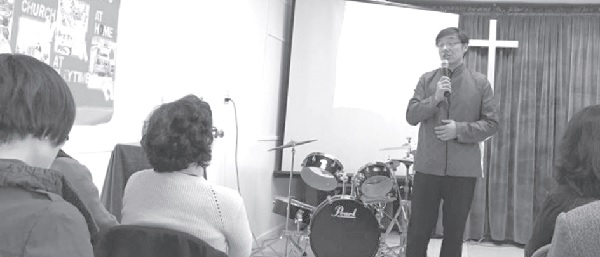
▲In March 2016, within just two weeks, Pastor Liu Xiaoting preached in every church in the greater New York area. The picture shows Pastor Liu Xiaoting preaching at a church in Brooklyn.
KRC: You went to the United States for a year as a missionary. Please share a few things that impressed you during this year.
Liu:After a year of preaching in the United States, what impressed me most was how much God uses Taiwanese Christians. In every city, I almost met passionate Taiwanese Christian leaders who were willing to sacrifice for the Kingdom of God, whether it was marriage ministry or evangelistic work; at the same time, We also saw the cooperation and efforts of Christians on both sides of the Taiwan Strait and three places. Many churches have English, Chinese and Cantonese ministries, which makes people feel the missionary mission entrusted to the Chinese churches in the United States by God.
Taiwanese Christian folks may wish to think seriously about why God led them to North America, not just to live and work in peace and contentment. With so many outstanding talents gathered together, can they contribute to their hometown, cultivate their hometown children, and at the same time encourage Taiwanese folks to have more contact with Chinese college students, so that the next generation of Chinese students studying abroad can leave a good impression on Taiwanese people, and let the Taiwanese people Thoughts and character have a positive impact on mainland compatriots. This will help both the Kingdom of God and the substantive relations between the two sides.
KRC: What is your biggest challenge in pastoring and missionary work in the United States?
Liu:Christians in North America live in scattered places and live busy lives. It is difficult to gather together. It is almost impossible to organize any gatherings during the week. They are not as flexible as Taiwanese churches. Due to the above factors, the unity of the church is quite difficult. Time and space constraints make it difficult for each other to work independently and to care for each other.
The lives of believers in North America are more stable than those in Asia. Therefore, believers are more comfortable, and their inner motivation needs to be ignited. At the same time, believers have a high level of knowledge, and it takes more time for co-workers to integrate.
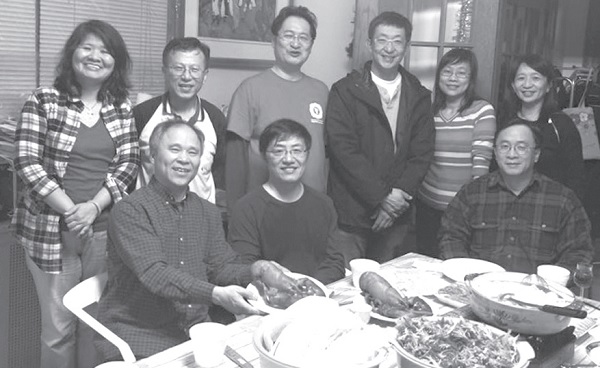
▲The brothers and sisters in New York warmly welcomed Pastor Liu.
KRC: Please share your observations and thoughts about the Chinese churches in North America this year.
Liu:Over the past year, I have seen that the Chinese churches in North America are in a "transformation period". The number of gatherings is almost declining, and the traditional church model is becoming increasingly rigid. However, crises are also turning points. It is this kind of constitution that provides unlimited possibilities for transformation. As long as Seeing the new direction, as long as we are diligent in connecting with the hometown church, a church only needs to invite 20-30 hometown youths to visit for a short period of time, let rotating manpower replace the traditional fixed manpower, and find a new global rhythm, which will inevitably bring about a new situation.
The darkness before dawn is the most unbearable. Chinese people are still pouring in in large numbers. North American churches are full of vitality. The spiritual resources left by Taiwanese Christians are for today’s missions. They continue to introduce rich spiritual resources from Asia, so that North America and both sides of the Taiwan Strait can The Internet has become a new branch of Chinese gospel ministry. Such explosive power of the gospel is exciting!

▲Pastor Liu Xiaoting took a photo with reporter Wu Limin.
Reporter Profile
The author got to know Pastor Liu Xiaoting because he served with the BRC Bethel Center in the James Ma Wall Chart Exhibition at the Toronto China Fortune Annual Conference in October 2015, and accidentally met Pastor Chen Qinwen, who was familiar with Pastor Liu. Through the connection and arrangement of BRC, there were 20 missionary tours in the Eastern United States from March 4th to 14th, which also included participation in pastoral staff fellowship meetings in New York and New Jersey.
While accompanying the preachers on the tour, I observed that Pastor Liu Xiaoting was approachable and humorous. He could always tell biblical truths through interesting stories, allowing the congregation to deeply understand them through laughter. He also participated in the Senior Fellowship, Women's Fellowship and even the Blessing Fellowship without fear of hard work, as well as sharing at the Canaan Bible College. The topics were diverse, from "The Value of Elders" to "Young People's Life Planning". They all have incisive, novel and unique insights, and they are willing to share the new concepts of "new media missions" and "global church" with church pastors and pastors even outside the gatherings.
It was even more shocking to see the protagonist of "Liu San Talks about Ancient Times" pop up from the screen. Pastor Liu is versatile and has performed lyrical songs during several sharing sessions with a beautiful singing voice. Pastor Liu also particularly likes playing table tennis and basketball, and focuses on evangelism through sports and music. In addition to pastoring churches and preaching around the world, he also writes articles online almost every day, and has also published several best-selling books. Among them, "Reading the Bible Through Time and Space" won the "Golden Book Award" in Taiwan last year. In addition, he also writes articles from Monday to Sunday Wuwei GOOD TV broadcasts "Liu San Lectures on Ancient Times" non-stop, with an astonishing output. In addition to wonderful sharing on stage, TV, and in writing, we also provide family tutoring on land, sea, and air. Pastor Liu, who has done so much, actually said with emotion in private that he "can only do a little bit" and often thinks about "what else can I do for God?" People are amazed by his extraordinary energy and think of it. The missionaries in the book "A Hundred Years of Blood of Martyrs" also had such emotions before they were martyred. I replied: "Usually people who have done a lot will realize that they are very limited." Seeing Pastor Liu like this, I no longer dare to say that I am too busy and have no time to serve!
Profile of Pastor Liu Xiaoting (Liu San)
"Liu San Talks about the Ancients" is the oldest Taiwanese-language program on Taiwan's Christian Good News TV station. It is also the only longevity program that has never been discontinued since its inception. The content is mainly about explaining the Bible, explaining it in simple terms, and is deeply loved by people of all ages.
Pastor Liu comes from a pastor’s family, and his parents have served in the Ximen Quaker Church in Chiayi for many years. Pastor Liu was called to serve full-time in China, and God entrusted him with long-term commitment in the two fields of "evangelism" and "youth work." In 1985, after graduating from the Chinese Department of Tunghai University, he immediately entered the China Evangelical Theological Seminary to receive training. After graduation, he entered the Cosmic Light and the Chaplaincy Department of Chiayi Christian Hospital to receive training in institutional ministry. He then devoted himself to gospel broadcasting and then to television production. He continued to exceed Twenty years.
Pastor Liu is often invited by campus fellowships and churches at home and abroad to serve as a camp speaker. He also collaborates with Rainbow Loving Family Children's Work, Dawn Club's drug rehabilitation ministry, and "Out of Egypt" gay ministry. Before 2009, he went to New Zealand and Australia for pastoral and missionary work for five years, expanding the scope of his service and starting online writing work. The books and various audio-visual products he published in recent years have received enthusiastic response.
Pastor Liu is currently the senior pastor of Taiwanese Lutheran Church of San Diego. For detailed information, please visit www.liu3.org
Journalist profileWu Limin: Convener of Media Evangelism and Outreach at Bethel Center in New Jersey, USA. She came to the United States with her husband in 1987 and has a son and a daughter. I have been engaged in financial computerization work in Taiwan and American companies for nearly 30 years. I retired early in 2011 and currently work part-time as an accountant in a printing company. I co-organized a "Dream Workshop" with my classmates to support the promotion of media education.
